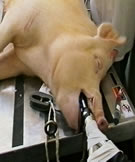 There are many issues surrounding the ethical aspect of xenotransplantation. One issue is that what the bible says about man destroying animal to live for himself. And since God created man “in the likeness of His image” should we preserve what is essentially God’s image or transform God into something that is not entirely human but human and animal combined. In the bible it says that ultimately humans were created to be just like God. And those humans have control over animals only to sacrifice for the benefit of man. Therefore xenotransplantation is accepted by the bible since animals are being sacrificed in order to help humans live and prolong death that could be reached by not performing the process of xenotransplantation. But along with that man must also respect animals that they sacrifice so that unnecessary suffering of the animal is prevented. As well as taking into account that the biodiversity and balance of species is not disturbed. The bioethics revolving xenotransplantation is also very debatable. The scientific weighing of whether the health concerns over the benefits is also a crucial decision that the doctor must make before making his final decision in performing the very risky operation. The scientist must weight the options of if the patient of the process of xenotransplantation is going to be better due to the process or if the procedure is ultimately going to harm the individual. Even before the acceptance of the patient to receive the transplant is decided doctors must create a theoretical situation of what could happen when the patient undergoes the operation. If the risk is too high some doctors will not allow the patient to follow through with the procedure. But if the process looks to be in good thought and will benefit the individual rather than hurt them than the doctor will follow through with the operation. And the final benefactor is the decision of the person to accept the transplant or reject it due to his or her own opinion. It is a fact that there are more than 5 times more people that are in dire of need of an organ on the waiting list that will actually receive one. But there is a huge moral issue in which doctors and scientist will need to be resolved before mainstream xenotrasplants are conducted. Many people in hospitals are in emergency need of an organ. But who are these people. Some of these people may be in the hospital because they have drunk liquor for their entire life and they need a new liver. Or some people may be there because of the years of smoking that have disintegrated their lungs into dust. But some people that need organs are people who have diabetes or different disease that cause their organs to malfunction and to die. Doctors and scientists will have to decide how the orders in which people are placed to receive their newly transplanted organs. Also if there is a special priority for people who are in critical condition. These are the special criteria that doctors will have to decide in order for the process of xenotransplantation to become a legal part of the medical practice. People who have caused themselves the damage to their body and have taken advantage of their precious organs should not be the first people in line to receive a xenotransplant. People who are in emergency need and people who have diseases as well as accidents should be ushered to the front of the line and given priority to this procedure since they are not in control of what happens to their organs. There should be a placement chart of how people are prioritized and if they actually want to receive this very dangerous transplant. The only countries that have public accepted the process of xenotransplantation to legally practice are the United States, the United Kingdom, and Spain. In 1998, a group of scientist attended a public convention in which they urged the FDA to ban “cross-species research” until all of the ethical and medical reason of xenotransplantation is resolved. But in 1999, the FDA released a guidance document that allowed specific clinical trials of xenotransplantation to proceed at a cautious pace.
|
    |